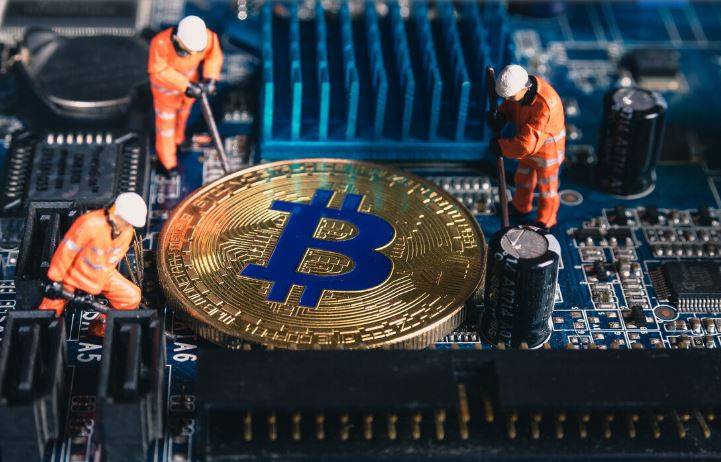The unexpected effect of crypto panic: These are not good times for crypto miners. From hoarding graphics cards, one of the keys to the GPU shortage and taking refuge in illegal installations, to facing the closest thing to a perfect storm.
The puncture in crypto values together with the high cost of power has made many miners rethink the profitability of their activity… and the future of the equipment they bought in times of fat cows or, at least, when they believed it was a good business.
Crypto Panic Among Miners
There is no need to speculate on the change in trend. The crypto panic is clearly seen in one of the most unexpected places. Mining rigs are arriving on the second-hand trading platform, equipment that goes on sale coinciding with the collapse of crypto values and the rise in energy prices, one of the main fixed costs for crypto miners.
Perhaps the data that stands out the most in some offers is the high sale price. In Walapop you can find rigs for 6,500 , 17,999 , 18,000 , 28,000 , 39,999 … Or even 50,000 euros —“little negotiable”, he warns— that a user asks for eight rigs with a power of 3.5GHS. The web also offers the assembly of a 3000 mh/s rig with rtx 3090 for 65,000 .
Similar announcements are found on other platforms, such as Milanuncios, were less than a month ago the announcement of two pre-owned rigs for 10,100 euros was posted, just over a week ago another one was uploaded for Ethereum for 4,900 and at the end of April it was added another of 4,200 .
Crypto Merchants See Red

Equipment trading is just one more indicator of the change in trend in recent months that is causing crypto panic. From reaching $68,000 barely half a year ago, Bitcoin has fallen below $24,000, the value at which it was moving earlier this week.
The drops in value are just as pronounced in other cryptocurrencies and securities, such as Ethereum, which has partially evaporated the interest that they aroused just a few months ago… and, consequently, the attractiveness of mining itself as a profitable business.
If that scenario were not complex enough in itself, another equally key factor has added to the crypto panic: the high price of electricity, at values much higher than those of just a year ago. This has forced the Government to adopt measures, such as the gas cap.
Despite the decrease in recent days, electricity was still 80% more expensive in the middle of this week than in 2021. From €90/MWh just a year ago, we have gone to an average price of € 165.59 .
El Salvador opted for bitcoin as its national currency. Now it’s about to go bankrupt
The sharp fall of Bitcoin in recent months (more than 50% from its all-time highs) can be painful for investors, especially those who cannot afford to hold out without selling waiting for a possible future rise. But the crypto panic is not as bad news for anyone as it is for El Salvador, the first country in the world to accept it as legal tender since September 2021.
Nayib Bukele, president of the country, decided to go all-in to this cryptocurrency by developing his own electronic wallet, Chivo Wallet, and collecting bitcoins to give bonuses to citizens, the equivalent of 30 dollars per person at the time of delivery.
The idea behind this movement, according to the Salvadoran government, was to open up business opportunities by reducing costs and attracting tourists. However, the bet is not going well in this first year, and things could get worse in 2023.
Crypto Panic and Sinking bonds
According to a study conducted by the National Bureau of Economic Research, only a fifth of Salvadorans who downloaded the Chivo Wallet cash app continued to use it after spending the $30 bonus provided by the government.
However, the government continued to announce plans along these lines, such as blockchain-based “volcano bonds” with which to finance itself to buy more cryptocurrencies —paralyzed by the little interest shown in them— or the ‘Bitcoin City’, a coastal city without taxes on income or contracts with its own geothermal power plant to mine bitcoins with hardly any energy cost.
Mining using volcanic energy has already been launched, taking advantage of existing facilities, although it was not very profitable.
Institutional and credit back
Fitch Ratings has already drastically reduced El Salvador’s debt rating from level B- to CCC, the lowest prior to the rating of pure speculation. A scenario of non-payment of its debts, known as “going into the default” , would imply losing access to financing in the markets, as happened with Greece in 2012 (138,000 million dollars) or Lehman Brothers in 2008 in the private sector (600,000 million dollars that made the world economy fall as if it were the first piece of a domino).
Moody’s gave it a minimum margin of confidence to be able to face the payment of 2023 bonds, 800 million dollars within seven months, although maintaining a high level of risk, since it is awaiting details on the reform of the system of pensions announced in recent months, something that could oxygenate the economy to deal with debts at the cost of the loss of purchasing power of its pensioners.
The IMF did not take long to recommend reversing the decision to nationalize bitcoin, something that also fits in with its interests as a central currency stabilizing the body, and warned that it could incur a breach of the conditions it sets for countries that request loans, that include overcoming the problems that led to that situation and that serve to guarantee the repayment of what was borrowed.
Something that the IMF understands does not happen with an economy based on a cryptocurrency, and that therefore can lead to the impossibility of accessing more financing, even if it does not go into default.
Closing Thought
The crypto panic was highlighted by the World Bank’s refusal to assist the country in the deployment of Bitcoin. An institutional veto does not help its future, especially with Bitcoin bonds that have not attracted a single investor. The financial instability that these global institutions warned of had risks that are intensifying.






